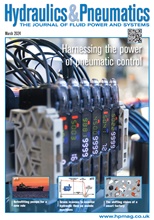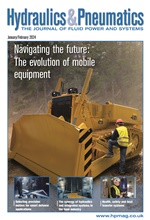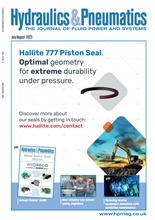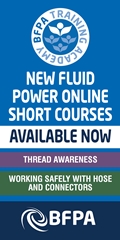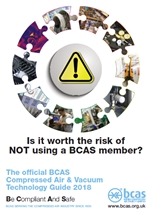- Home » Editorial » Hydraulics
Apex Hydraulics keeps on the right track for effective maintenance
Unforgiving environments present challenges for hydraulic systems that depend upon clean oil, sound seals and piston rods free of dents in order to function. The rail maintenance industry provides a particularly harsh atmosphere for hydraulics. The grinding process can cause sparks, damaging parts such as seals. The fast speeds can see stones and debris bouncing up and hitting the rod at speed, causing dents, which can develop in to scoring, peeling and pitting to piston rods, which can then damage the seals, causing leakages and premature failure.
Environmentally friendly and sustainable
A UK-based national rail company was finding that the grinders on its maintenance trains were failing regularly due to malfunctioning hydraulics. The repairs and associated down time were costly and time consuming. Apex Hydraulics was approached to design a viable alternative, one that is not only able to withstand longer durations in service but is also more environmentally friendly and sustainable.
The maintenance train is designed to repair areas of damaged track by the vehicle travelling along the rails, using a number of grinders to grind and re-weld the track damage. Lasers pinpoint the areas of the track that needs work, translating this to electronics which trigger the hydraulics to bring the grinders down into the optimum position.
In response to this challenge Apex developed a two-fold strategy to protect against the existing vulnerabilities in both the seals and piston coating, whilst presenting benefits to the environment.
The previous seals were made with nitrile rubber and polyurethane, which could only withstand heat of up to 80degC. Apex chose to integrate seals manufactured with a synthetic rubber and fluoropolymer elastomer and PTFE which are able to withstand heat up to 200degC.
Apex also used its piston coating, COREX – a specialised coating developed in conjunction with industry experts. The usual Hard Chrome Coating (HCP) used for pistons can corrode, particularly under harsh environments, and the by-products of the manufacturing process are extremely detrimental to the environment. Legislation exists regarding the disposal of Chrome for good reason – its damaging effect on the environment and the regular changes required by habitual failure mean that it is not sustainable.
COREX is a Tungston Chromium Carbide compound which outperforms HCP with regard to density, porosity, pressure and hardness, as well as being more environmentally friendly.
Greater cylinder protection
The hardness and bond strength of COREX is said to be double that of HCP, with a 1400Hv hardness providing a bond strength of
In addition, HCP is up to 10 times more porous than COREX, which along with the micro-cracks produced during the application process, leads to much greater incidents of corrosion. Corex avoids micro-cracks by providing a thicker uniform coating which is free from defects and has superior adhesion to the substrate.
Apex comments that these new hydraulics are in their infancy, but the company is expecting to see a marked decrease in incidents of hydraulic failure, leading to less downtime and fewer expensive replacements for the rail network.
-
Smart Manufacturing & Engineering Week
05 - 06 June, 2024
NEC, Birmingham -
HILLHEAD 2024
25 June, 2024, 9:00 - 27 June, 2024, 16:00
Hillhead Quarry, Buxton, Derbyshire UK



